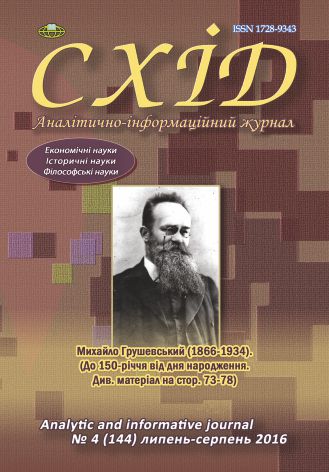Сhanges in public and legal status of the rabbi in the Russian Empire (XIX-XX c.)
DOI:
https://doi.org/10.21847/1728-9343.2016.4(144).74221Keywords:
government policy, the orthodox camp, yeshivas, headers, Rabbi, ZionismAbstract
The article makes an attempt to analyze the evolution of the social and legal status of the rabbi in the context of state policy formation towards the Jews. In the diachronic section we analyzed the legal framework which had been "aligned" with the government's policy on the national question, the issues of religious policy and particularly in the "Jewish question".
The author identifies three periods which in varying degree show the government's attitude to the institution of the rabbinate, as well as the changes that have occurred in the social and legal status of rabbi. Detailed analysis of the legal framework allows allocating of two requirements vectors formed by the government. The first one is the idea of education, which forms the main demand of the tsarist government to the rabbi - educational qualification. The second one regulates the activity of a rabbi as a controlled person associated with the public authorities.
The author also makes an analysis of the representatives of the orthodox camp activity, defines its role in trying to "reanimate" the social status of the rabbi.
Downloads
References
Bartal, I. (2007), The Jews of Eastern Europe (1772-1881), Gesharim Publishing House, Jerusalem, p. 123 (rus). doi: 10.9783/9780812200812
Polozhenie o evreyakh 1804, available at: http://www.ukrstat.gov.ua/.http://http://www.gumer.info/bibliotek_Buks/History/Article/_UstrEvrei.php
Dolbilov, M.D. (2010), Russkij kraj, chuzhaya vera: Etnokonfessional’naya politika imperii v Litve i Belorussii pri Аleksandre II, Novoe literaturnoe obozrenie, Moscow, 140 p. (rus).
Lukyanov, S.А. (2009), Ro’ Departamenta Dukhovnykh del Inostrannykh Ispovedanij MVD Rossijskoj Imperii v realizatsii gosudarstvennoj veroispovednoj politiki (1832-1917), Sputnik, Moscow, 77 p. (rus).
Miller, А. (2006), Imperiya Romanovykh i natsionalizm, Novoe literaturnoe obozrenie, Moscow, p. 77.
Mindlin, А. Imperator Аleksandr II i evrejskij vopros, available at: http://amindlin.narod.ru/alexII.htm
Morozova, А.V. (209), The Jewish population of Livoberezhna Ukraine in the second half of XIX - early XX century, Kyiv, 276 p. (ukr).
Nathans, B. (2002), Beyond the Pale: the Jewish Encounter with Late Imperial Russia, ROSPЕN, Moscow, p. 154 (rus).
Ob ustrojstve mestnogo upravleniya delami very evreev (1863), Departament Dukhovnykh Del, St. Petersburg, 12 p. (rus).
Levanda, V.O. (1874), Polnyj khronologicheskij sbornik zakonov i polozhenij, kasayushhikhsya evreev (1649-1873), S.-Peterburg, 1185 p. (rus).
The Russian State Historical Archive, fond 821, opys 8, delo №107 (rus).
The Russian State Historical Archive, fond 821, opys 9, delo № 22/131 (rus).
The Russian State Historical Archive, fond 1269, opys 1, delo № 136 (rus).
The Russian State Historical Archive, fond 1269, opys 1, delo №43 (rus).
Trudy gubernskikh komissij po evrejskomu voprosu (1884), 1, S.-Peterburg, pp. 127-128 (rus).
Shah Ran Friz (2012), The Jewish family in Russia, in: I. Lurie (Eds.), History of the Jews in Russia. From the Partitions of Poland to the Fall of the Russian Empire (1772-1917), 2, The Bridges of Culture, Moscow, pp. 243-244 (rus).
Stampfer, S. (2014), Families, Rabbis and Education Traditional Jewish Society in Nineteenth Century Eastern Europe, The Bridges of Culture, Moscow, 142 p. (rus).
Lurie, I. [ed.] (2012), The history of the Jewish people inRussia. From partitions of Poland until the fall of the Russian Empire, Volume 2, Mosty Kultury - Gesharim, Moscow, 534 p. (rus).
Levin, V. (2016), From Revolution to War: Jewish Politics in Russia, 1907-1914, Zalman Shazar Center for Jewish History, Jerusalem, 478 p. (hebr).
Downloads
Published
How to Cite
Issue
Section
License
Copyright (c) 2016 Larysa Moskalenko

This work is licensed under a Creative Commons Attribution-NonCommercial-NoDerivatives 4.0 International License.
1. Authors bear responsibility for the accuracy of facts, quotations, numbers and names used.
2. Manuscripts are not sent back.
3. The publisher does not always agree with the authors' opinion.
4. The authors reserve the right to authorship of the work and pass the first publication right of this work to the journal under the terms of a Creative Commons Attribution-NonCommercial-NoDerivatives 4.0 International License. This license allows others to distribute (copy) the published work for non-commercial purposes, provided there is mandatory attribution to its authors and a link to the first publication in our journal.
5. The authors have the right to conclude separate supplement agreements that relate to non-exclusive work distribution in the form in which it has been published by the journal (for example, to upload the work to the online storage of the journal or publish it as part of a monograph), provided that the reference to the first publication of the work in this journal is included.

